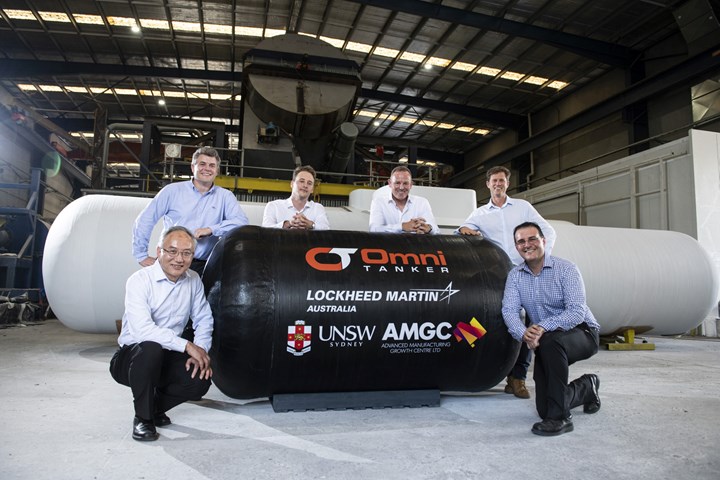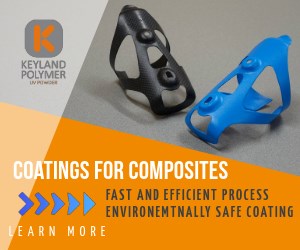Omni Tanker, Lockheed Martin complete composite hydrogen storage tank project
The collaborative project includes Type IV and Type V tank demonstrators for storing and transporting cryogenic and liquid hydrogen, helium and more.

Australian composites manufacturer Omni Tanker (Smeaton Grange) announces the development of two new carbon fiber composite tanks for the transport of cryogenic and liquid hydrogen and helium.
Developed in collaboration with with Lockheed Martin Australia (Canberra) and the University of New South Wales (UNSW, Sydney), and with support from the Advanced Manufacturing Growth Centre (AMGC, Sydney), the tanks built as part of this project include:
- a Type IV, fluoropolymer-lined, carbon fiber composite tank, and
- a Type V, linerless, carbon fiber composite tank.
The tanks can store and transport liquid hydrogen, as well as oxygen, hydrogen peroxide and hydrazine at high pressures under extreme cryogenic temperatures.
In testing, the tanks are reported to have achieved their performance metrics, including when exposed to cryogenic temperatures as low as minus 269°C.
Together, the project participants identified a new application for Omni Tanker’s patented OmniBIND solution, which links an interior thermoplastic tank to a lightweight composite exterior tank. The use of a nano-engineered additive product, developed by a UNSW, prevented matrix cracks usually present at extremely low temperatures in pressure vessels storing liquefied hydrogen.
As a result of this project, operational-scale demonstrator versions of the tanks for Lockheed Martin’s LM2100 satellite have now been manufactured at Omni Tanker's advanced manufacturing facility.
Omni Tanker CEO and Founder Dr. Daniel Rodgers says, “By leveraging Omni Tanker’s capabilities, we have been able to translate our composite road tanker technology to the global space sector — where performance, weight, and cost are of paramount importance. Omni Tanker can develop and deliver composite pressure vessels to meet demanding technical requirements quicker and at a lower cost than exotic materials, such as titanium, which are widely used in the space sector.”
Christopher Hess, Lockheed Martin Australia’s head of industrial development says, “The global strategic environment is constantly evolving, and Lockheed Martin is committed to working with industry, through exemplary partners such as Omni Tanker, UNSW, and AMGC, to deliver a world-leading space capability.”
UNSW’s Scientia Professor Chun Wang adds, “As a result of extensive nano-engineering efforts, we now have composite structures that can withstand the extreme cold of liquid hydrogen without experiencing microcracking or hydrogen gas leak.”
The co-funded project was worth a total $1.59 million, and received co-investment from the Advanced Manufacturing Growth Centre to the value of $700,000, while in-kind contributions totaled $194,000.
Related Content
-
Paris Air Show 2023 highlights
The Paris Air Show, one of the largest aerospace trade shows in the world, returned for the first time since 2019 and proved that the global aviation industry industry is very much alive and kicking.
-
Infinite Composites: Type V tanks for space, hydrogen, automotive and more
After a decade of proving its linerless, weight-saving composite tanks with NASA and more than 30 aerospace companies, this CryoSphere pioneer is scaling for growth in commercial space and sustainable transportation on Earth.
-
Microwave heating for more sustainable carbon fiber
Skeptics say it won’t work — Osaka-based Microwave Chemical Co. says it already has — and continues to advance its simulation-based technology to slash energy use and emissions in manufacturing.

.jpg;width=70;height=70;mode=crop)














